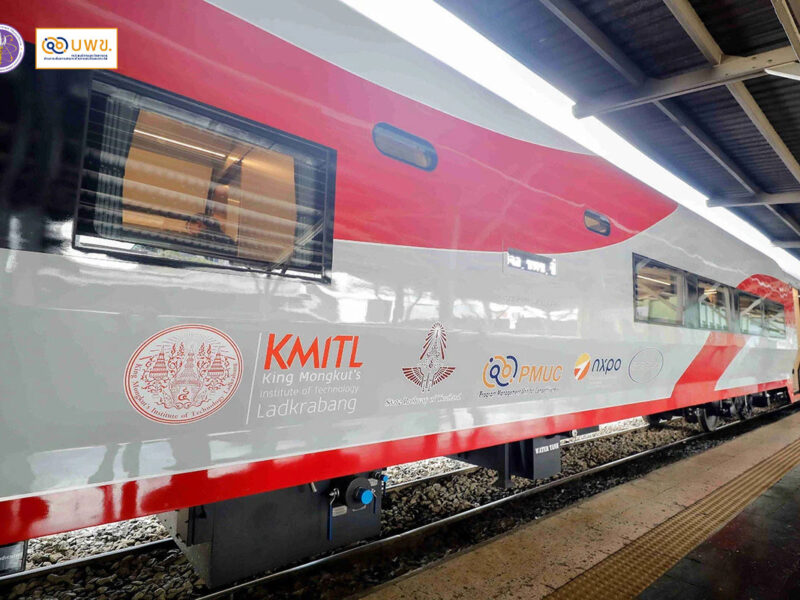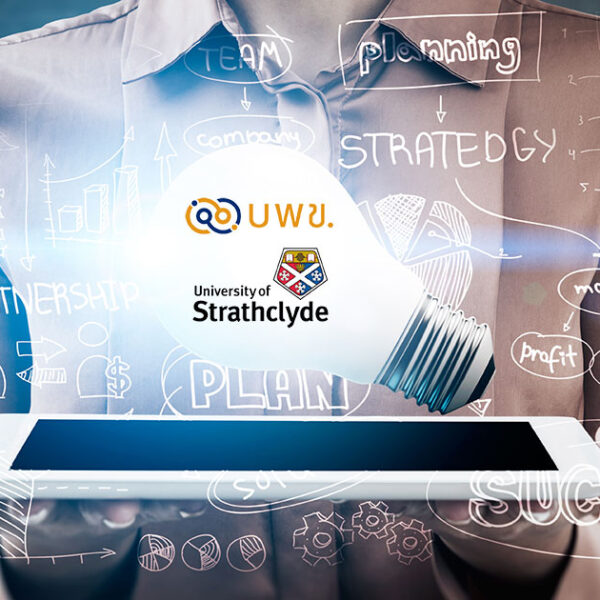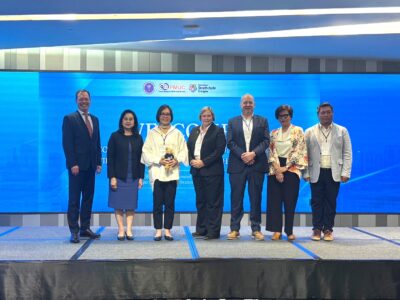“Household Carbon Market Platform” invites the Thai population to accumulate points from solar cells in exchange for products, encouraging clean energy use and combating global warming with high-quality research supported by the Ministry of Higher Education, Science, Research and Innovation (MHESI).
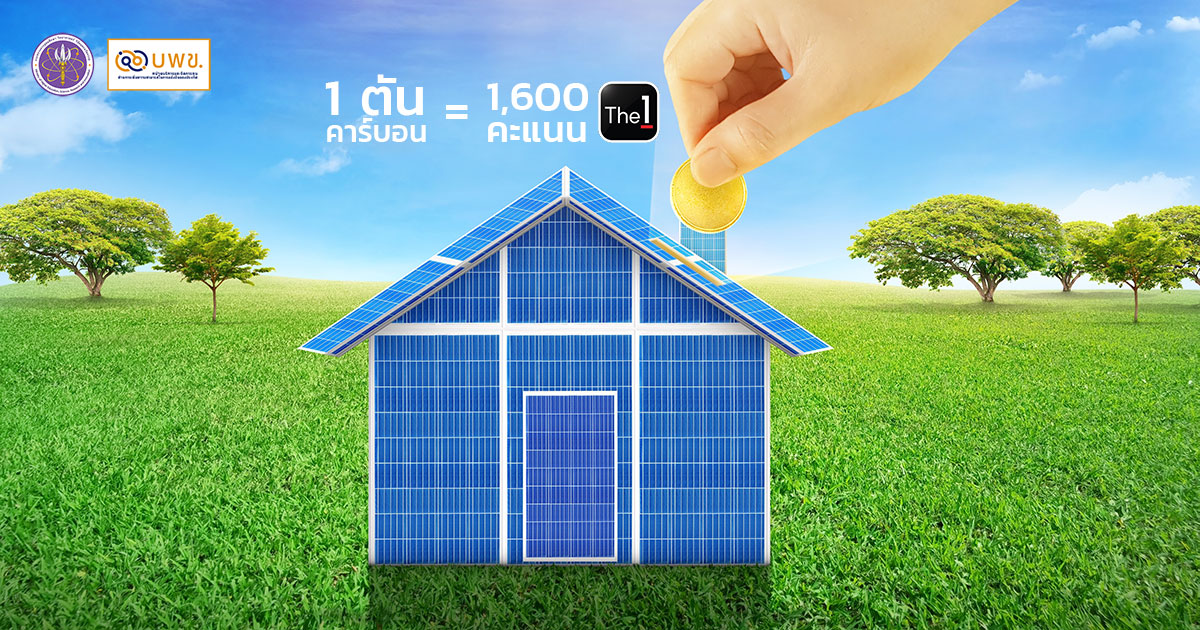
The primary goal for most homeowners who install solar panels is to reduce their electricity bills or sell excess electricity back to the Electricity Generating Authority of Thailand (EGAT). However, the process of selling excess electricity is complicated and often not cost-effective for the average household. This led a group of researchers to propose the idea of creating a platform that can easily convert electricity usage from solar panels into value, such as transforming it into accumulated discount points for shopping, watching movies, dining, etc., which could incentivize the public to install solar panels.
In addition to helping reduce global warming, this initiative aims to propel the country towards achieving carbon neutrality by 2050 and net-zero greenhouse gas emissions by 2065. This has resulted in the development of the “Household Carbon Market Platform.” Seeing this, it would be expected that many people would want to transform their ordinary rooftops into solar cell rooftops to participate in this platform.
The research and development project for the “Household Carbon Market Platform” has received funding from the Program Management Unit for Competitiveness (PMUC) under the Ministry of Higher Education, Science, Research, and Innovation. This represents a significant advancement in promoting energy efficiency, reducing greenhouse gas emissions, and truly opening up avenues for households to access the carbon credit market, leading to an environmentally friendly economy, a clean future, and sustainability.
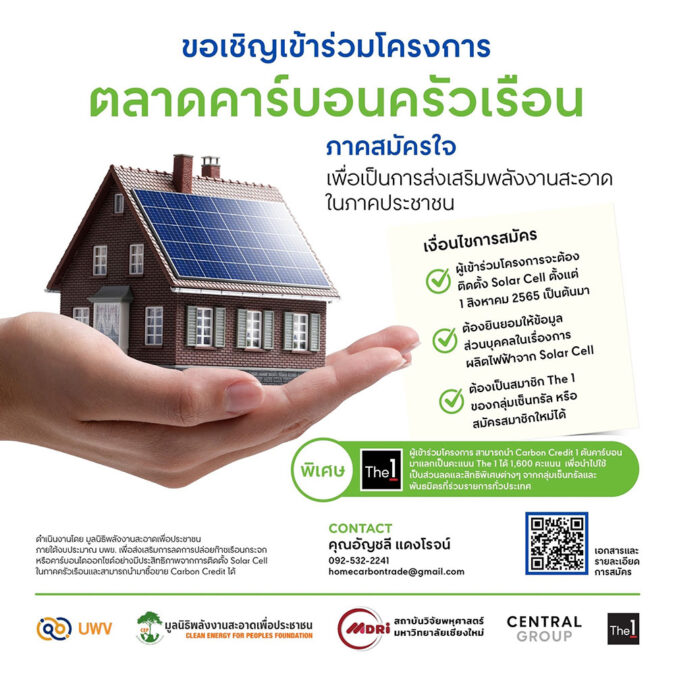
The project originated from researchers at the “Clean Energy Foundation for the People,” who aimed to create value from electricity usage derived from solar panels by developing a platform that allows citizens who install solar panels to convert carbon credits generated from solar cells and certified by Thailand’s T-VER standard into accumulated points redeemable for goods.
The Clean Energy for People Foundation was established to conduct research on renewable energy, clean energy, and to support households in installing solar panels. The goal is to spark public interest in installing solar cells, especially since the Ministry of Energy’s previous campaigns to buy back excess solar cells from EGAT have not yielded satisfactory results due to public perception of insufficient returns on investment and the complexity of the conditions involved. Thus, researchers from the foundation brainstormed on how to solve this issue for the government and encourage the public to embrace clean energy, particularly solar cells, as a key driver towards achieving the nation’s carbon neutrality goals.
This led to the research project “Voluntary Household Carbon Market Platform,” which serves as an intermediary for all citizens to benefit from converting electricity usage from solar panels into redeemable points for goods. This project has attracted interest from Technical Team Company Limited, a private entity specializing in platform development, which has joined to invest and develop the research to advance through Technology Readiness Level (TRL) 4, designing a prototype platform that allows for trial processing. Therefore, they applied for research funding from the PMUC to take it to a higher level, aspiring to create a perfect platform in the future.
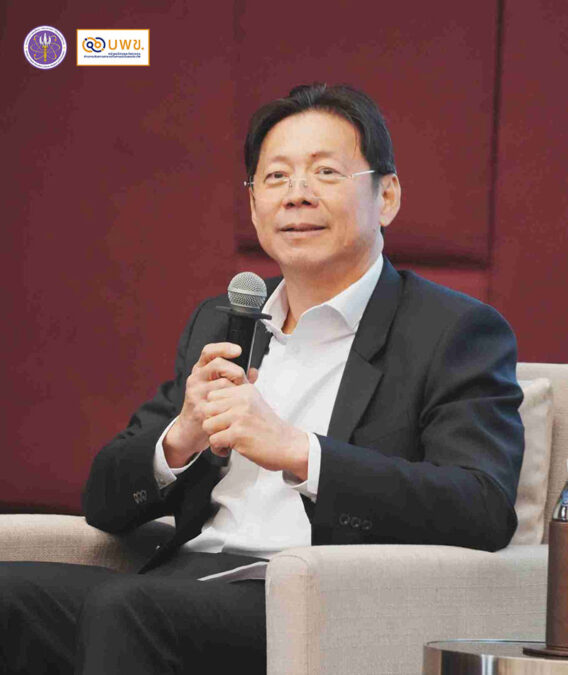
Dr. Suwit Thoraninthapanit, Chairman of the Clean Energy for People Foundation, stated at the press conference for the voluntary household carbon market project that the initiative promotes clean energy use in support of a circular economy and a low-carbon economy, aligning with international cooperation to mitigate global warming. The voluntary household carbon market project has established a platform for monitoring renewable energy production and reducing greenhouse gas emissions, focusing initially on households that have installed solar cells due to their substantial number and the clear government policies supporting them.
The developed platform will enable the exchange of reducible greenhouse gases into products or services with participating businesses. Businesses can utilize the carbon credits they acquire in a circular economy approach and in efforts towards carbon neutrality or net zero emissions, which will benefit the stakeholders involved as follows:
Households: They will have opportunities to generate income from using clean energy or can exchange it for products and services from participating businesses through the developed platform. This also adds value for clean energy users as part of the efforts to mitigate global warming.
Businesses: They can operate within a circular economy framework regarding clean energy use by purchasing carbon credits or exchanging them for products and services to households involved in the developed platform. This will enhance their business image, contribute to sales growth, and promote sustainable and efficient business development.
Thailand: The country can establish a voluntary household carbon market, which will help achieve the national greenhouse gas reduction goals. Both the public and businesses will shift towards using clean energy, alongside other measures that can further reduce greenhouse gas emissions. This will also create mutual benefits in various areas, such as mitigating the impact of air pollution, maintaining energy security, fostering technological innovations, reducing energy costs, creating jobs, and decreasing urban migration. This will result in Thailand’s progressive and sustainable growth.
Mr. Natee Sitthiprasart, Vice Chairman of the Clean Energy for People Foundation, provided additional information stating that the goal of the “Voluntary Household Carbon Market Platform” is to allow every household that installs solar panels to benefit from it. Initially, aside from inviting the general public to participate in the project, they are collaborating with Sena Development Public Company Limited, the owner of the Sena Village project, to pilot 300 households in the program. The concept of the Sena Village project is that homeowners who purchase homes will use clean energy and reduce their electricity bills while contributing to the fight against global warming.
“The platform’s highlight is that we connect stakeholders in the carbon credit market. To illustrate this simply, reducing greenhouse gases is a requirement for the industrial sector. All factories must switch to clean electricity and upgrade machinery and equipment to reduce carbon emissions as per trading partner conditions. Large companies may manage this due to sufficient capital, but smaller companies with inadequate funding face challenges. For instance, if the requirement states that this year they must reduce carbon dioxide emissions by 100 tons, but the company can only reduce 50 tons, what can be done for the remaining half? The solution is to purchase carbon credits from others to supplement their reduction from 50 tons to 100 tons, which requires less funding. That is the goal of the voluntary household carbon market platform, serving as an intermediary for households to sell surplus solar cell credits to industries seeking to purchase carbon credits. Initially, we will implement a points system for exchanging products.”
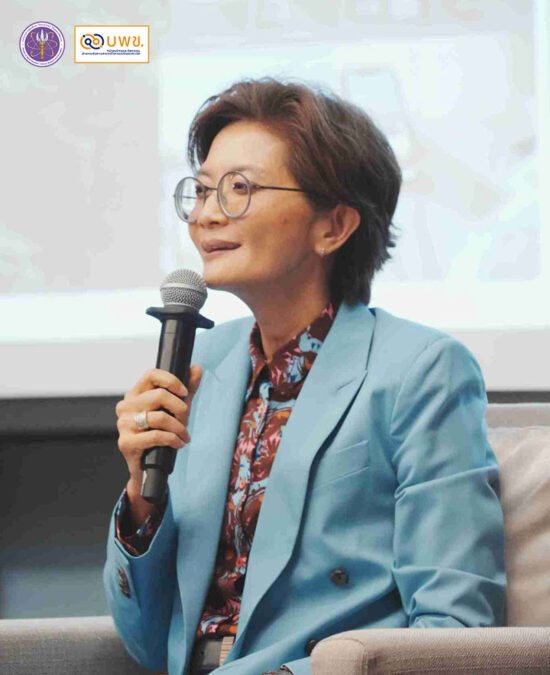
Sena is considered the first real estate developer in Thailand to start constructing homes with solar roofs ready for use since purchasing homes over ten years ago. Assoc. Prof. Kesara Thanyalakphak, Ph.D., Managing Director of Sena Development Public Company Limited, stated that participating in this project is aligned with the trend of using renewable energy for the future. This not only helps reduce living costs for homeowners but also minimizes carbon emissions, which are a major cause of global climate change. Sena emphasizes the importance of developing projects and supporting the innovation of new renewable energy solutions that cater to the lifestyles of homeowners, which aligns with the organization’s goal of reducing carbon emissions.
Particularly, the concept of Zero Energy Housing can save up to 38% of household electricity usage. Furthermore, promoting a Decarbonized Lifestyle allows homeowners to live an eco-friendly life simply by living with us. Currently, Sena has installed solar roofs for homeowners in all its projects, including single-family homes and townhomes, totaling over 1,000 units. For this collaboration, Sena homeowners with solar installations can apply to participate in the project, where the carbon credits generated can be exchanged for points to be used as discounts or for future purchases. For instance, homeowners who install a 5 kW solar system can have their carbon credits calculated and can convert them into 600 The 1 points per month, or 7,200 points per year. This initiative creates opportunities for all sectors to actively participate in serious environmental care for a sustainable quality of life.
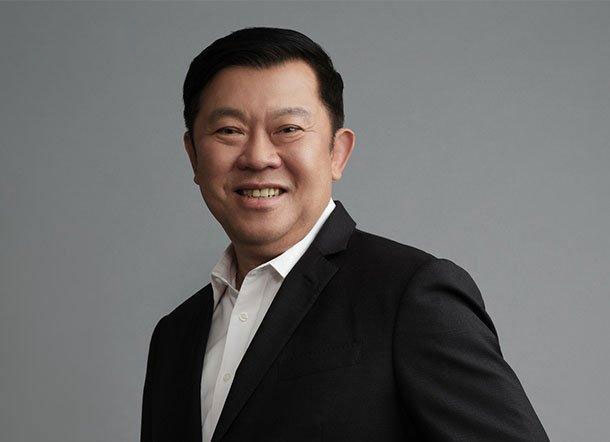
Another key partner joining the voluntary household carbon market platform project is Central Group. Mr. Pichai Jirathiwat, the Managing Director, views that currently, Thailand has a high demand for carbon credits, which is expected to increase significantly in the future due to the rising awareness and commitment at both the national and organizational levels towards achieving Carbon Neutrality and Net Zero Emissions. The global issue of Climate Change is critically important, and everyone must collaboratively address this problem, especially the business sector, which has the potential to reduce greenhouse gas emissions from various activities.
“Central Group thus aims to purchase carbon credits to offset various event activities. Participants in the project can exchange 1 ton of carbon credits for 1,600 The 1 points, which can be used as discounts on products and services and for benefits within the Central Group nationwide. Central Group is committed to ensuring that business growth goes hand in hand with sustainable environmental development, recognizing the need to start from the beginning of the supply chain to the end of proper management. One of the goals is to transition to the use of clean and sustainable energy to reduce the environmental impact of business operations, while also alleviating pollution issues through clean energy, aligning with global environmental goals.”
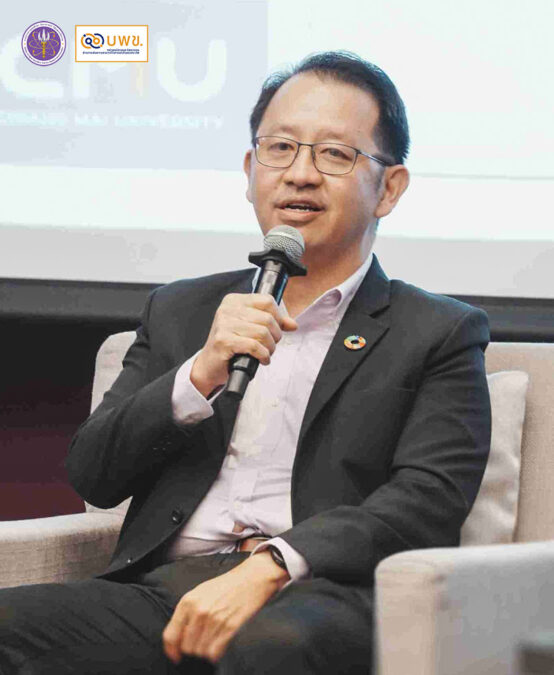
However, many still wonder how challenging it is to aggregate the electricity consumption of each household to calculate carbon credits. Assoc. Prof. Wongkot Wongapai, Deputy Director of the Multidisciplinary Research Institute at Chiang Mai University, which will oversee these processes, provided information that the institute is registered as an external evaluator for Thailand’s voluntary projects. It has conducted assessments of greenhouse gas emissions according to various standards, such as the Thailand Voluntary Emission Reduction Program (T-VER), commonly known as carbon credits, set by the Thailand Greenhouse Gas Management Organization (Public Organization) or TGO. The preliminary process involves six steps: (1) preparing the project documentation, (2) verifying the documentation or Validation, (3) registering the solar project with TGO, (4) implementing the project along with various measurements, (5) preparing documentation to review the carbon credits obtained before submission, and (6) applying for carbon credit certification from TGO. The verification of documents and reviews is vital and necessary for the country, as well as demonstrating responsibility towards society and the environment in reducing greenhouse gas emissions in the future.
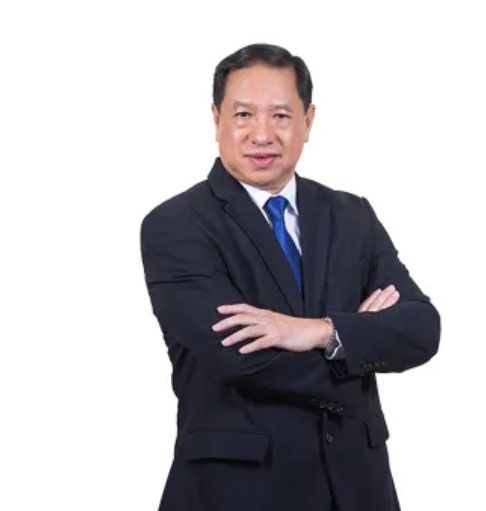
Mr. Natee illustrated that in the past, the inspection of electricity usage involved staff walking to record meters at each household. However, nowadays it is digital, allowing for the development of a digital platform that connects with every household participating in the project to monitor their electricity consumption for the month and calculate the kilograms of carbon reduced. Once the data is verified, it can be submitted to TGO for certification of carbon credits for each household. Each household can then store carbon credits, which they can redeem for points to purchase goods from partners associated with the platform.
As Central, as the owner of The 1, can utilize the redeemed carbon credits in various company projects, this benefits the business in terms of image and environmental preservation. Generally, entities that trade carbon credits according to TGO standards are mostly legal entities, but this platform makes it accessible to the public. If other industry groups, such as restaurant owners or cinema owners, are interested in becoming partners with the household carbon market platform, like Central or Sena, it will lead to increased usage of clean energy across the country, benefiting both the nation and the world significantly.
Mr. Natee also highlighted a key point that has brought the project to this stage: the research funding support from TGO, which has a vision for future trends. TGO plays a crucial role, even with just a one-year research funding support from August 2024 to July 2025. This promotion allows the platform to continue, developing a business model between private platform developers and the public users, along with industries needing carbon credits for organizations.

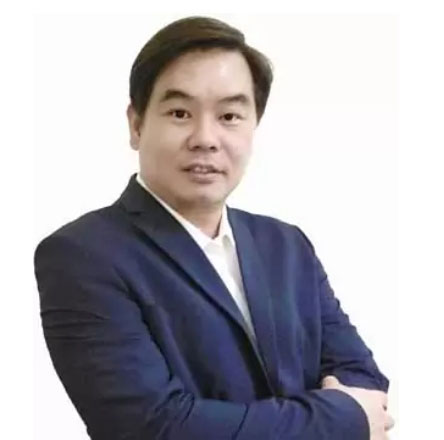
Mr. Akkaradech Supichayangkoon, Advisor to the Chairman of the Clean Energy for People Foundation.
Meanwhile, Mr. Akkaradech Supichayangkoon, advisor to the Chairman of the Clean Energy for People Foundation, added that this project is akin to creating a bush, starting with the first cluster of 300 households, the second expanding to 5,000 households, and the third growing to 40,000 and then 100,000 households progressively. He is confident that the foundation will attract many more partners to join the project, similar to Central and Sena, who see this project as valuable and that ONEP has funded research for it, meaning this project can be further developed. This tree will continue to grow more clusters. At the same time, he called for cooperation from the media to help disseminate information to the public to jointly reduce greenhouse gas emissions. When the public accesses the platform and the private sector buys carbon credits, this will contribute to making the project stable and sustainable.
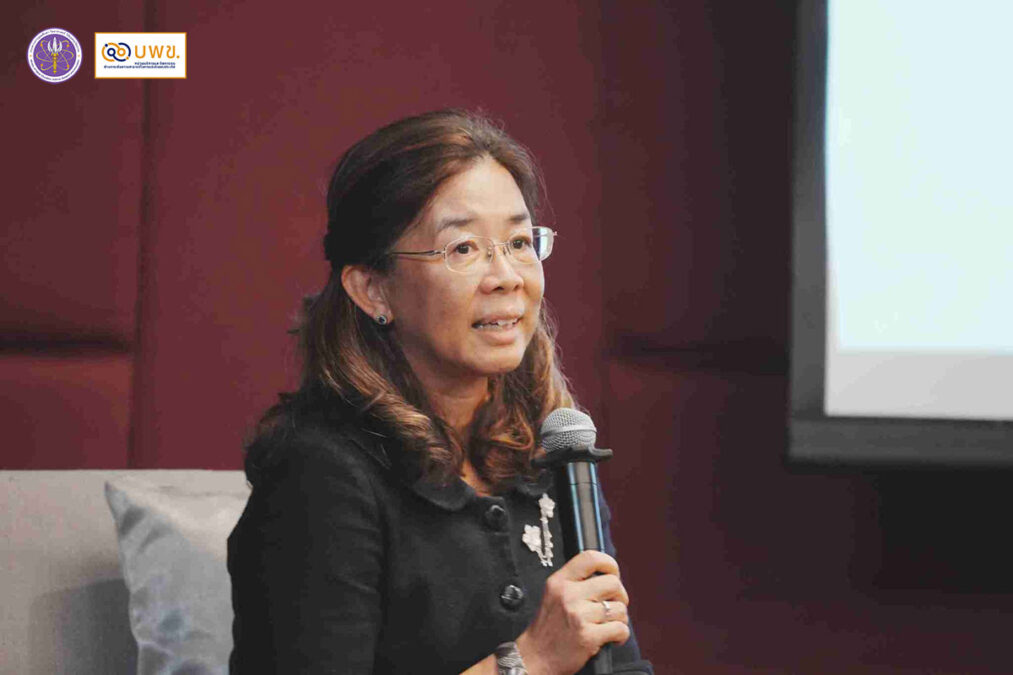
To conclude, Professor Dr. Apanee Leuangnarumitchai, Chair of the Subcommittee for the Energy, Chemistry, and Bio-materials Program at PMUC, spoke about this project as an agency that funds research and development of the voluntary household carbon market, aimed at promoting the use of clean energy in supporting a circular economy and a low-carbon economy. This is under the program for developing technologies and innovations for clean energy utilization, enhancing the bio-circular-green economy (BCG) regarding clean energy, renewable energy, bio-materials, and bio-chemicals into a high-value economy that is sustainable and increases the country’s income. This aims to develop the Thai economy through a value-creating and creative economy, enhancing competitiveness and self-sufficiency sustainably while moving toward the future by utilizing science, research, and innovation in conjunction with the development of the voluntary household carbon market platform.
The platform will allow for tracking energy production from rooftop solar systems and the amount of reduced greenhouse gas emissions, as well as exchanging the reduced greenhouse gases for goods or services from participating businesses. Furthermore, it aims to establish an ecosystem for the voluntary household carbon market platform that can respond to the needs of users, such as households wanting returns from energy use and businesses needing carbon volumes for engaging in the circular economy and low-carbon economy in their operations, with an attractive exchange rate for transactions to develop the economy and create sustainable low-carbon social value.
The voluntary household carbon market project is currently accepting applications from the public to participate until July 31, 2024.

